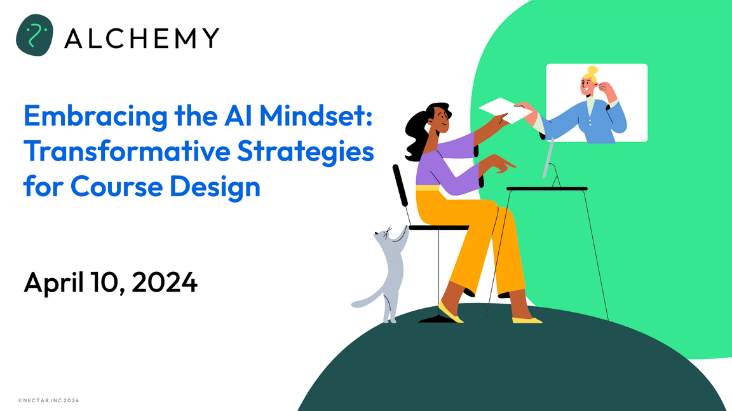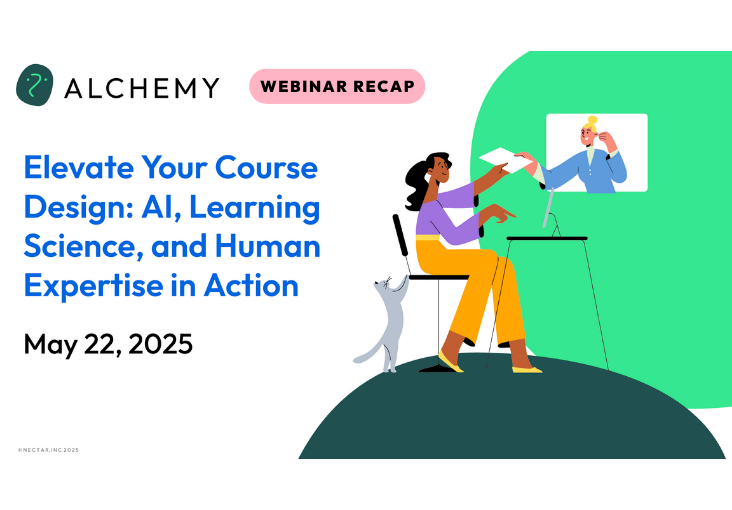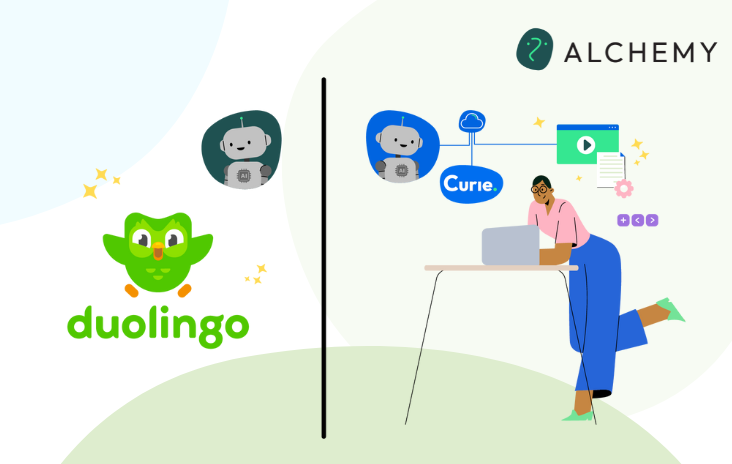Recap
Embracing the AI Mindset: Transformative Strategies for Course Design

Embracing the AI mindset has become crucial for educators looking to enhance their courses and maximize student success in today’s rapidly evolving educational landscape. In our recent webinar, “Embracing the AI Mindset: Transformative Strategies for Course Design,” Michelle Kassorla, associate professor at Georgia State University and co-moderator of EDUCAUSE’s AI in Education Committee, shared insights from a year of teaching “with and against AI” where she integrated AI into every assignment. Let’s explore the key takeaways from the enlightening discussion.
Introduction: Collaborating with AI for Enhanced Course Design
The webinar kicked off with an emphasis on viewing AI as a collaborative tool rather than a separate entity. Dr. Brett Christie, VP for Educational Innovation and Inclusivity at Alchemy, underscored the importance of educators working alongside AI to achieve learning objectives effectively. This collaborative approach encourages educators to leverage AI technology while maintaining their teaching philosophies and guiding students towards success.
An Instructor’s Journey with AI Integration
Dr. Kassorla shared her journey of integrating AI into course design, particularly focusing on multimodal education. She highlighted the symbiotic relationship between AI and multimodal learning, demonstrating how AI can enhance learning experiences through diverse modalities. Dr. Kassorla’s experience serves as a testament to the transformative potential of AI in education when used thoughtfully and ethically.
Strategies for Teaching with AI: Ensuring Responsible Use
A significant aspect discussed in the webinar was the importance of teaching students to use AI responsibly and ethically. Dr. Kassorla emphasized the need for specific instructions to prevent misuse of AI tools, incorporating group work, and implementing formative assessments to foster a culture of responsible AI usage. By guiding students in ethical AI practices, educators empower them to harness AI technology effectively while upholding academic integrity.
AI Fluency for Career Readiness: Preparing Students for the Future
As AI continues to shape various industries, developing AI fluency among students has emerged as a crucial aspect of education. Dr. Christie highlighted the significance of AI fluency in enhancing students’ career readiness and preparing them for the demands of the future workforce. By equipping students with AI literacy and critical thinking skills, educators empower them to navigate the complexities of AI-driven environments with confidence.
Conclusion: Navigating the Future of Education with AI
The webinar shed light on the transformative potential of embracing the AI mindset in course design. By fostering collaboration between educators and AI technology, implementing responsible AI usage strategies, and prioritizing AI fluency for students, educators can unlock new opportunities for innovation and student success. As we navigate the future of education, embracing the AI mindset emerges as a cornerstone for driving positive change and shaping the next generation of learners.
Incorporating AI into education isn’t just about adopting new technology; it’s about reimagining the possibilities and leveraging AI as a catalyst for positive transformation. As educators, embracing the AI mindset empowers us to create dynamic learning experiences that prepare students for the challenges and opportunities of tomorrow’s world.
Watch the full webinar here and visit our AI and ChatGPT Resources for Higher Education webpage for the many resources shared by our presenters and audience during the webinar.
Watch Now

